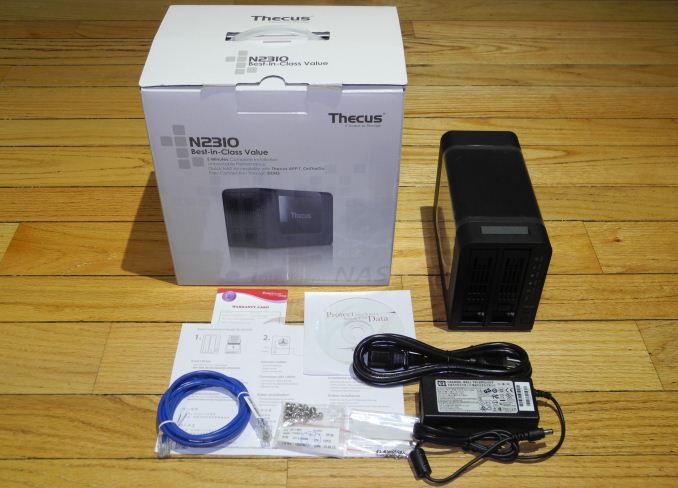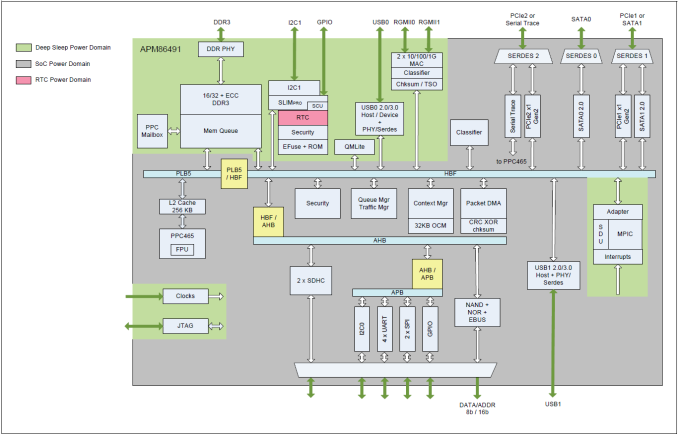Thecus N2310 Budget 2-bay NAS Review
by Ganesh T S on July 6, 2014 2:30 PM EST- Posted in
- NAS
- AppliedMicro
- Thecus
Hardware Platform and Usage Impressions
The N2310 package promotes the ease of setup, remote access and value propositions as key points of the unit. In addition to the main chassis (which is surprisingly well constructed for a budget unit), we have a 6 ft. RJ-45 cable, hard drive mounting screws, a quick setup guide, a 40 W (12V DC @ 3.33 A) adapter and a power cord customized to the country of sale.
The front face of the unit has two physical buttons (one for power control and one for USB copy) and a host of LEDs for power, disk and network status. On the rear side, we have a USB 2.0 and a USB 3.0 port, a RJ-45 port, a recessed reset button and a power inlet. A Kensington security slot is also available.
The N2310 is based on the Applied Micro's APM 86491 SoC. We covered the launch of the 'Catalina' platform based on this SoC back in January 2012. With a PowerPC 465 core running at 800 MHz, the SoC boasts of a host of accelerators aimed at reducing the CPU load for NAS applications.
From the block diagram above, it is clear that we don't need any bridge chips to enable the various ports of the N2310. The USB 2.0 and USB 3.0 ports are directly off the SoC, and SERDES1 can be used as the second SATA port. There are two RGMII ports available, and only one of them is used for providing network connectivity.
In terms of setup, Thecus targets the entry-level consumers by guiding them through a desktop program (Intelligent NAS) which determines the IP address of the N2310 (assuming a DHCP server is available). The program allows for either manual or automatic RAID creation (sensible choices of RAID 1 for 2 disks and JBOD for 1 disk). In case of existing partitions, the program helpfully indicates the issue to the user before allowing for format of the disks. As a final step, the program also provides a facility to associate / create a Thecus ID to use in conjunction with the N2310. This ID enables the creation of a DDNS address and use of the T-OnTheGo mobile apps.
The web user interface has not really changed much since we reviewed the Thecus N2560 last year. A walk-through of the available features in the web UI is provided in the gallery below.
One of the most important apps available for the N2310 is Plex Media Server. In our limited testing, it works pretty well, as long as there aren't any transcoding requirements. One of the major drawbacks of the Thecus OS is the fact that RAID migration from JBOD to RAID-1 is not available. So, we started our evaluation with two disks in RAID-1. Fortunately, hot-swap and RAID recovery worked very well (in fact, this is the first Thecus NAS that we have reviewed where the rebuild process worked without a hitch). However, other professional reviewers online don't seem to have had the same luck.
Considering the target market, Thecus removed the iSCSI functionality as well as encryption capabilities from the OS. Given the price point, we believe Thecus is justified in doing so.




























39 Comments
View All Comments
roman.md - Sunday, July 6, 2014 - link
imho, The average user will be happier with a 100$ cubietruck, with dual-core 1 Ghz ARM (vs single-core 800 Mhz PowerPC), 2 GB RAM (vs 512 MB).Impulses - Sunday, July 6, 2014 - link
Average user or average enthusiast? The latter - maybe, the former - not even.nvalhalla - Sunday, July 6, 2014 - link
cubietruck is a bare MB for $100. You still need a case. And it only has 1 SATA2 and USB 2.0. So there goes RAID.I'll take a dedicated device over a hacked together mess.
jabber - Sunday, July 6, 2014 - link
Meanwhile back in the real world...Some people (read most) just want something that works out of the box. I dont blame them in this instance.
DanNeely - Sunday, July 6, 2014 - link
thank you for making the obligatory "I could build something myself for less money and can't understand why anyone would want a prebuild NAS as a result" comment./sarcasm
Guspaz - Monday, July 7, 2014 - link
I did build my file server myself for less money than what was commercial available... but only because what was commercially available was enterprise-grade stuff that cost a small fortune.If there had been any prosumer-grade prebuilt appliance-type stuff that could have held 15 drives, I would have bought it instead of doing it myself. The problem is the only things that can do 15 drives are big, expensive, and very loud stuff meant to go in a datacenter. My home-built solution fits in a mid-tower ATX case, but building it was a huge pain, pain that I would have liked to avoid.
I understand perfectly well why somebody wants something that just works out of the box. Such a thing just doesn't exist for more than a handful of drives at once.
Samus - Monday, July 7, 2014 - link
cubie, seriously, has the worst IO performance of anything I've ever seen. I think the [single] SATA 2.0 connection is actually a bridged via USB, because I've never seen transfers over ~25MB/sec. You'd be just as bad off with a $35 RaPI as a NAS. The CPU and memory means very little if they are that IO limited.betam4x - Sunday, July 6, 2014 - link
I'm going to be honest here, you should stay FAR away from Thecus as a company. We made the dire mistake of buying a Windows based NAS from them. The NAS didn't come with a full version of Windows (despite practically all the resellers claiming it did). In addition, getting a copy of Windows Storage Server 2008 is impossible due to it being discontinued and they refuse to certify Storage Server 2012 for use with their products DESPITE the fact they still sell the NAS hardware itself. To top it all, the RAID is software only. It has a RAID card, but reads something like prototype or beta only (can't remember which), do not distribute. After contacting Thecus we were told that their windows storage solutions are meant for software RAID only. Our purchase led to a major retailer pulling the Windows based NAS completely from it's website due to our issues and offering us a considerably large gift card for the trouble.Samus - Monday, July 7, 2014 - link
I've had iffy luck with Thecus (honestly, I've not used one of their NAS) but by no means are they as bad as, say, Norco, Sans Digital, or as Ganesh stated, D-Link/Netgear/WD.Samus - Monday, July 7, 2014 - link
Even though this runs a standard linux kernel, Synology is hard to ignore in the consumer (and even SMB) NAS market simply because the OS is so flexible. I've set them up to run everything from remote access servers to MySQL (which can host a Quickbooks database, website CMS, etc.)Synology offers dozens of free apps for their OS, such as uTorrent, cloud replication\remote backup services, AirTunes server, XBMC portal, VPN, database hosting, even WINE emulation. Then there are the paid apps that bring in the big dogs like mail services (hosting, ie Exchange, SPAM filtering, domain management,) RAS, and recently, virtualization. The hardware isn't really powerful enough to do this stuff on a corporate scale, but the point is it can be done for light loads, making the death of the small business server even more obvious in the near-term as these network appliances offer nearly all the services servers do.